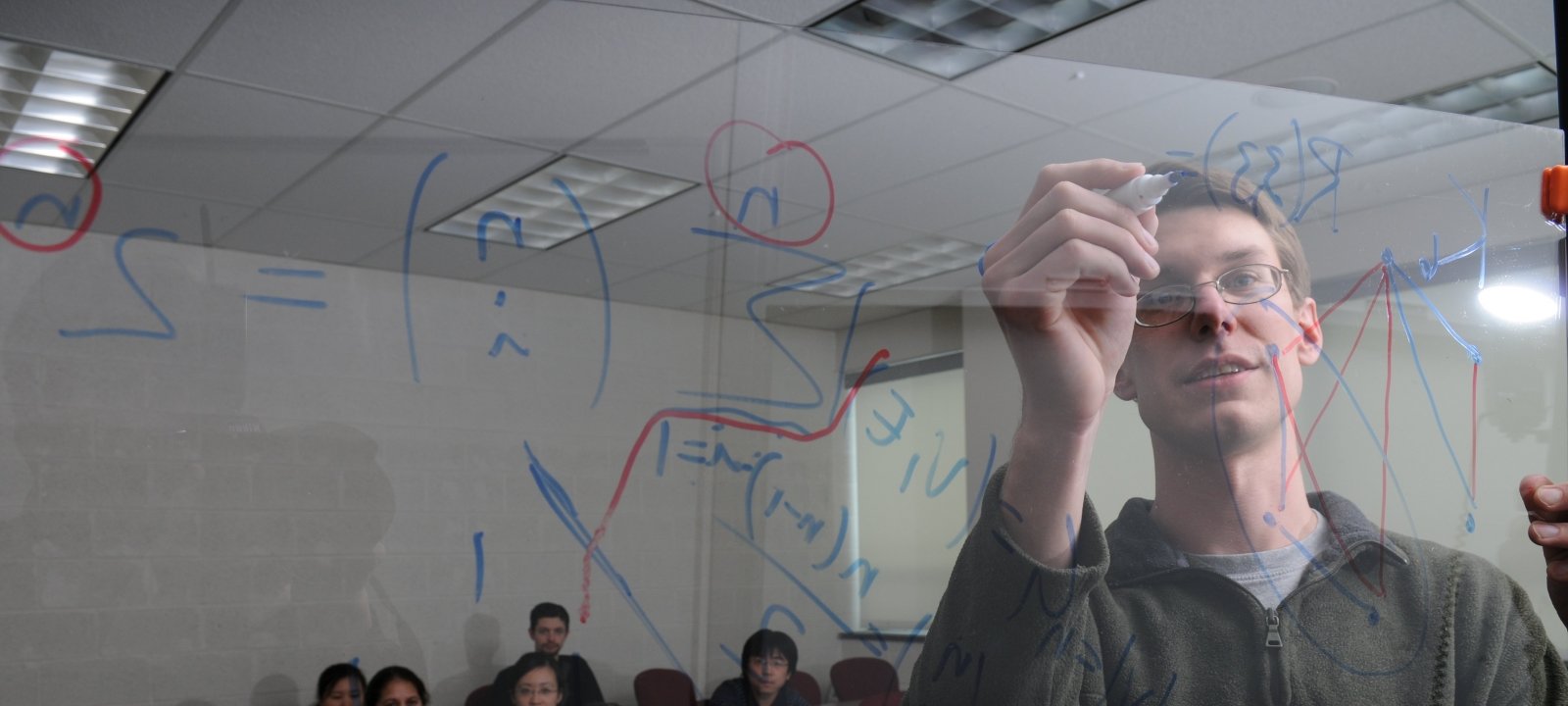Mathematicians and statisticians have a ton of career choices, from analyzing data and applying mathematical and statistical techniques to solving challenges in business, engineering, healthcare, and other fields. Find out all the reasons why it's worth it to study math.
Often called the language of science, mathematics requires both passion and curiosity. If you love math, you already appreciate its intrinsic logic and beauty. You know that math is fun. But what many may not have discovered about math is that a degree in mathematics can prepare you for an exciting career. Math-based fields include business, computer science, finance, medicine, teaching, and the many branches of science, technology, and engineering. After you earn your undergraduate degree in a mathematical sciences field, you could also progress on to graduate studies.
Mathematician was ranked No. 13 for Best Technology Jobs and No. 67 for Best STEM Jobs by U.S. News & World Report as of April 2025. Career outcomes for math, statistics, and related fields—including job placement and starting and median salaries are excellent. It's no wonder that so many choose to study math.
Why Study Statistics?
Students studying math can focus on statistics. Statistics is one of the fastest-growing fields in the country and is ranked No. 9 for Best Technology Jobs, No. 50 in Best STEM Jobs, and No. 92 in 100 Best Jobs by U.S. News & World Report as of April 2025.
There are more jobs for statisticians and college grads with strong math skills than there are people to fill them. The importance of mathematics is shown by the demand for professionals skilled in math. According to the US Bureau of Labor Statistics, an increasing number of statistician positions are opening up for those who hold bachelor's degrees, even though such positions have typically required a graduate degree in statistics or mathematics.
The world needs smart students with strong math skills who are motivated to take data, process it, visualize it, and communicate it in ways that strengthen industries and society. Companies from Google to Ford Motor Company, and firms involved with medical research, manufacturing, environmental sciences, and government, all rely on data for everything from market research to quality control. Computational and applied mathematics positions focus on modeling data and designing computer algorithms to solve problems or predict outcomes.
Graduates who have earned a bachelor's degree in math-related fields can work in industry or go on to increase their skills and earning potential by pursue a graduate degree in statistics or a related field, like biostatistics, epidemiology, or analytics.
 What Do Math and Statistics Majors Do?
What Do Math and Statistics Majors Do?
Those who earn a degree in math can model combustion in diesel engines. They can focus on business analytics and big data. Math majors specializing in advanced statistics can apply those statistics to find the genetic root of diseases. Professionals with math degrees also develop communication theories needed for future quantum computers. They create statistical models for predicting debris flows after wildfires. In industry, applied mathematics can result in a model that indicates what products and other ingredients are needed in supply-chain centers across the world.
Career Paths in Math and Statistics
So much more than crunching numbers, at its core, a math-centered career is about solving problems. Students pursuing a career can be mathematicians or work in the science, technology, engineering, and math environment of their choice. You have an opportunity to make a difference in an area that matters to you:
- Academic and research institutes
- Aerospace and transportation providers
- Analytics and forecasting organizations
- Chemical and pharmaceuticals manufacturers
- Communications service providers
- Computer information and software firms
- Consumer product companies
- Energy systems firms
- Electronics and computer manufacturers
- Engineering research organizations
- Government agencies
- Insurance companies
- Investment management firms
- Medical device companies
Find more on career opportunities in math and statistics:
- The Mathematical Association of America Careers
- The American Mathematical Society Early Careers
- Thinking of a Career in Applied Mathematics?
- Society for Industrial and Applied Mathematics
How Much Do Math and Statistics Majors Earn?
Earning a degree in mathematical sciences can mean higher pay and increased job satisfaction. According to the US Bureau of Labor Statistics, the mean salary for a mathematician is $122,520, with the top 10 percent earning close to $187,660. Payscale shows an entry-level salary of $72,380. The mean salary for statisticians is $112,330 with the top 10 percent earning close to $170,700 and entry-level pay of $71,595.
-
Figures from payscale.com, accessed April 2025.
-
Figures from U.S. Bureau of Labor Statistics (BLS), dated May 2024.
 The Future of Math and Statistics
The Future of Math and Statistics
Job opportunities in math and statistics are anticipated to grow much faster than the average for all other occupations.
As big data, the combination of mathematics and computers, and the use of electronic devices revolutionize the way we live and interact with one another, the need for people with strong math and stats backgrounds will become increasingly important. Biostatisticians will need to be involved as our medical and pharmaceutical industries respond to the demand for personalized medical care and the needs of an aging US population. Machine learning, numerical analysis, and scientific computing will impact the ability to capture, store, analyze, and comprehend data.
Math-based careers will also continue to include many disciplines, industries, and career paths. Skilled mathematicians can choose to center their careers in any of the branches of mathematics, including algebra and geometry, but can also continue to expand into less commonly considered areas, such as philosophy. The history of mathematics readily demonstrates that the mathematical field is ever-evolving, continuously relevant, and increasingly important to all the ways we work and live.
Your math degree can lead to many different professions. Most entry-level positions require a bachelor's degree. Our undergraduate academic advisor in mathematical sciences, David Olson, says these tips can help you prepare to earn your degree in mathematics or its many related fields.
Tips for High School Students
If you're currently in high school and are considering getting into a mathematical sciences field, consider these suggestions to help you feel prepared and confident:
- Make an appointment with your high school advisor or another trusted source of career advice, like a pre-college outreach program, so you can get the most current material and advice they have available.
- Focus on taking all the math courses your school offers, including Advanced Placement (AP) courses in math and science if they are available to you.
- Seek out workshops, events, and summer youth camp experiences offered by universities or other institutions that will give you a taste of what it would be like to work in a math-related field.
- Attend career-focused events at your school that offer insights into different professions. In some jobs, such as those where working with statistics is required, the connection between math and the career will be clear. In other cases, ask how your skills in math would be used with that particular profession.
Choosing a College/University for Mathematics
Choosing a school where you want to study mathematics is easier when you take the time to do a bit of research and also think about how the school will be a good fit for you overall, academically and personally. These tips can help:
- Look at colleges and universities with well-established STEM programs, meaning that science, technology, math, and engineering are a valued part of the curriculum. This means more options for you—it isn’t necessary to major in a program named “Math” or “Mathematics” to have a successful career in a math-related industry.
- Explore degrees that fall under the math umbrella, including science, physics, philosophy, chemistry, algebra, geometry, biology, and statistics.
- Make sure the schools you're considering offer accredited degrees because most employers will only consider graduates from such institutions.
- Visit the schools you're interested in. Ask to meet faculty, and ask lots of questions about the programs you’re interested in, scholarships and financial aid opportunities, and application requirements and deadlines.
Apply to the schools that feel like the right fit for you and your goals sometime between your junior year and the beginning of your senior year. It’s a good idea to keep track of important application deadlines so you don’t miss them.
Tips for College Students
If you’re currently in college, our mathematical sciences advisor recommends these tips to help you be successful in the mathematics field of your choice:
- Take a mathematics placement exam like ALEKS or find out where you have been placed for your entry-level math course as soon as you’re accepted into your school. At some universities, this step is a requirement.
- Work with your academic advisor to choose the appropriate degree program and courses that will give you the necessary knowledge and skills for a career in a mathematics field.
- Participate in math projects. You’ll discover that math is fun when you put it into action. Look for opportunities to run scientific simulations through classes, extra credit projects, or during extracurricular activities including student organizations, professional conferences, co-ops and internships, and research projects at your institution.
- Form relationships with faculty members in your program. These connections will provide a supportive network as you pursue math-related or pure mathematics career roles during and after your time in college.
- Connect with professionals. Whether you're at a conference or an on-campus career fair, seize every opportunity to meet and learn from professionals in the field—you never know when these relationships will come in handy!
- Keep your resume up to date and brush up on your interviewing skills. Your institution may even have a dedicated career center that can help you.

 Many Michigan Tech mathematics and statistics majors—upward of 30 percent—choose to dual major, most commonly pairing their mathematics
major with a complementary major (or minor) in
Many Michigan Tech mathematics and statistics majors—upward of 30 percent—choose to dual major, most commonly pairing their mathematics
major with a complementary major (or minor) in